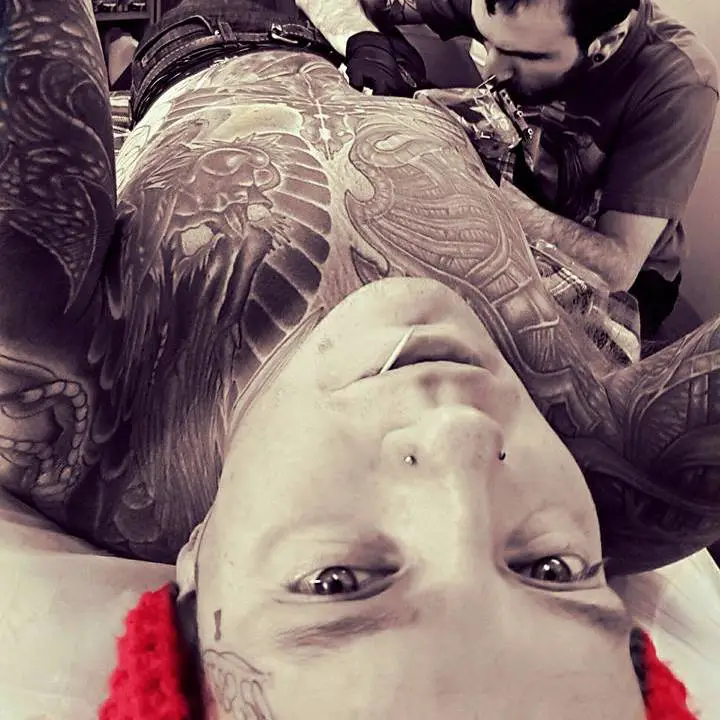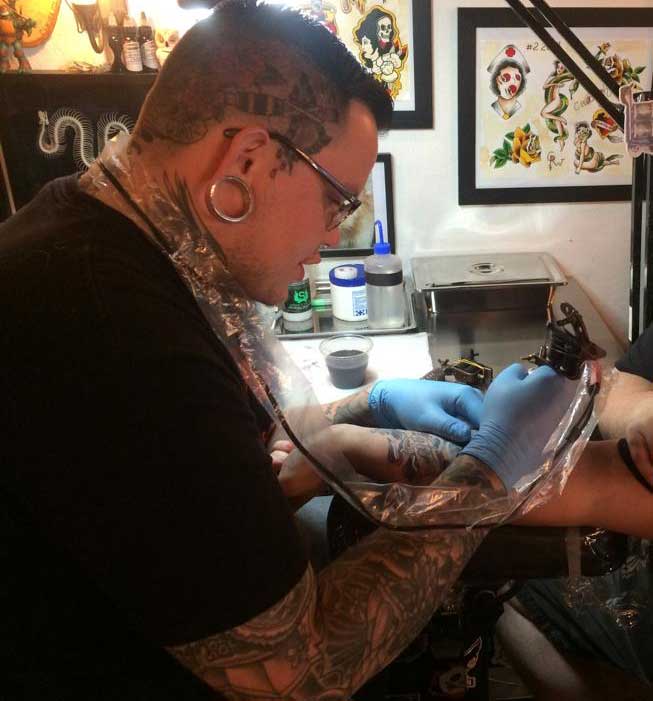 JEFFERSON CO., Pa. (EYT) – Tattoos have been a part of different cultures from around the world for thousands of years, and the attitudes toward them have changed as much over time as the artwork itself.
JEFFERSON CO., Pa. (EYT) – Tattoos have been a part of different cultures from around the world for thousands of years, and the attitudes toward them have changed as much over time as the artwork itself.
(Pictured above: Justin Brentzel)
One of the oldest known specimens of a tattoo on an actual body was carbon-dated around 5,200 years old, according to Smithsonian Magazine.
While tattoos have held cultural significance in civilizations such as the Maori of New Zealand where a tattoo was a symbol of rank, social status, power, and prestige, our more recent history with this form of body art has been fraught with stigmatization and negative stereotypes.
ExploreJeffersonpa.com spoke to a few local tattoo aficionados about their own experiences in our region with their visible tattoos.
Brenda, who asked to go by only her first name for this article, is a Jefferson County resident who works in the mental health field. She began getting tattoos at the age of 16.
Brenda has a total of over twenty tattoos, ranging from roses and pearls on her upper arms to several nautical themed tattoos on her legs, and she has plans for more.
“My legs are not done, they start a few inches below my knees. I still want to add to them to make them fuller.”
“The new world is expression and dealing with changes all of the time. The ink I have lets me feel good and proud of what I have overcome and what I will overcome in my life,” explained Brenda.
While some people may be surprised at an individual in the mental health care field having visible tattoos, Brenda says that more and more employers are ignoring the old stigmas and hiring employees with tattoos.
“My employers don’t have a problem with them. They just started to ask that we cover them when representing the company. I have even been to trainings this year where the trainers have a lot of visible tattoos.”
She also noted that her clients don’t seem to have any issues with her tattoos, either.
“Not one of the people I work with have a problem with them. Actually, they think it is me and wouldn’t want me to change. You cannot help anyone if you are not yourself.”
“There are so many professional people with them, and it is just showing how they make a statement.”
“Small towns are even starting to get with the times. If they don’t, they are not going to have any employees.”
While her employers and clients haven’t had many issues with her tattoos, one person in her life was less than fond of them when she began getting more: her husband.
She said that although he wasn’t fond of her taste for ink at first, he has come around over the years.
“He sees I’m the same person I always have been.”

Professional tattoo artist Jacob Brentzel
Justin Brentzel – who is originally from Leeper and currently lives in Oil City – got his first tattoo the day he turned 18. He and his brother, Jacob, who is a professional tattoo artist, grew up around a lot of people with tattoos and considered it a normal thing to do.
“My mom had tattoos since she was in her early twenties, my stepdad has tattoos, and my brother has actually tattooed both of them and a bunch of other family members, cousins, aunts,” said Justin.
Jacob Brentzel is a tattoo artist at Evolved Body Art in Columbus, Ohio.
“He’s one of the best artists I know, so of course I’m going to have some from him, and I love his style. I’m actually scheduled for some more work in a couple of weeks,” explained Justin.
While most of his immediate family sports tattoos of their own and are accepting of his choice to have a lot of body art, he admits that not every family member embraced it at first.
“My grandma was the only one with a problem with it, but she’s pretty much over it, too, because everyone in the family has some sort of visible tattoo. My mom just said as long as you don’t offend anyone with your tattoos, you can get whatever you want.”
Justin noticed some increased negativity when he started getting more and more tattoos, covering most of his body – some in somewhat more “taboo” places.
“It’s when you start getting them in more taboo places like your hands or your neck or your face or anywhere that’s more visible and harder to cover up. I’ve definitely had a lot of negative experiences in the past, a lot of stereotypes like ‘criminal’ or ‘druggie.’ I had somebody ask if I escaped from the circus one time. I see a lot of mothers shield their children from me a lot of times.”
His experience with his children and their classmates has given him an interesting perspective on how younger generations see tattoos.
“My son definitely wants one, and my daughter has expressed interest in growing up to be a tattoo artist. When I go to her school functions, I’m the cool dad. The kids are all interested in my tattoos.”
He also noted that his children have taken notice of the negative attitudes some people hold toward tattoos.
“When (my daughter) notices people giving me dirty looks in a store or something, she gives them one right back. She has my back.”
Although he said that having such visible tattoos can be an issue in some career fields, there are a number job opportunities available for those with a lot of visible ink, and more and more businesses are willing to hire people with visible tattoos.
Justin currently holds a position where he travels around to different store locations to repair shopping carts for a major retailer.
“Being that I travel, I’m in a lot of cities, too, so it’s a little more lenient there. But when you’re in areas even a little more country than Clarion County, you definitely get dirty looks. They don’t know what kind of person you are, they don’t know if you part of a gang or whatever.”
“I’ve had jobs where I dealt with customers face to face, like sales jobs where I’m going to their door at their home and they’re seeing me. It’s just something more for me to overcome to show that I’m not just what I look like.”
“It helps that some of the bigger name companies, such as Walmart, are actually employing tattooed people now, which is always good to see, because before you had to cover them. Now they’re definitely more lenient because it’s hard to hire somebody that doesn’t have a tattoo.”
While he does still get some negative reactions, Brentzel noted that he has begun to get more compliments and curious questions than negativity over the last few years.
“The most common question is ‘What how are you going to feel about your tattoos when you get older?'”
“My response is I’m not promised I’m going to get old. I could leave Walmart and get hit by a car, knock on wood that I don’t, but it could happen. You don’t want to be 90 years old thinking about the things you wanted to do but didn’t because you were worried about what people thought of you.”
He’s also had people approach him about exactly how many tattoos he has and how much he’s spent on them over the years.
“At this point, I can only go by the hour, and it is over 320 hours on my entire body. As for cost, I just tell them I’ve lost track.”
Jennifer Kissell-Dudek (pictured above), who lives and works in Oil City, also began getting her tattoos at the age of 18, while she was working for a popular restaurant and bar in Clarion.
“I was a bartender at an accepting job,” she noted.
Kissell-Dudek, who currently works as the Aquatics Director/Head Swim Coach at Oil City YMCA, currently has a back piece, two full sleeves covering her arms, a songbird on each thigh, a chest plate, and a Misfits Marilyn on her ribs.
While she loves her current job, she believes her tattoos may have affected her hiring prospects in the past.
“I actually think I didn’t get a job because of my tattoos.”
Even in her current position, she believes her tattoos may have been an issue for some people when she first took on the position.
“When I first got my YMCA job, I think a lot of people definitely judged me and thought I was reckless. Now that I have worked hard for five years, I think the parents and older members have begun to realize that tattoos don’t make the person.”
Though she has noticed a change in attitudes, she still has a certain comfort zone when it comes to wearing clothing that shows the extent of her tattoos.
“When I’m at work at the Y, I feel comfortable in a swimsuit because it’s my department, but I feel very naked in a tank top anywhere else in the building because people that don’t know me and don’t know I have a full back piece definitely stare. They aren’t mean but they definitely stare.”
Kissell-Dudeck has also noticed that a lot of people seem to believe that each tattoo must have some deeper meaning.
“People always think that there should be a story behind all my tattoos because of all the tattoo TV shows. It’s almost like they are disappointed when I say I like water and Japanese artwork.”
Like Justin Brentzel, she also gets a lot of questions about her tattoos, mainly about where she has them, how long they took, and what artists she recommends.
“I would say that younger people stare less, and they do seem to think that if they have a tattoo also then we are best friends. They also wanna show me their work,” she noted.
Even though there are still some pervasive negative stereotypes about those with visible tattoos, the general attitude in our area seems to be changing.
Copyright © 2024 EYT Media Group, Inc. All rights reserved. Any copying, redistribution or retransmission of the contents of this service without the express written consent of EYT Media Group, Inc. is expressly prohibited.











